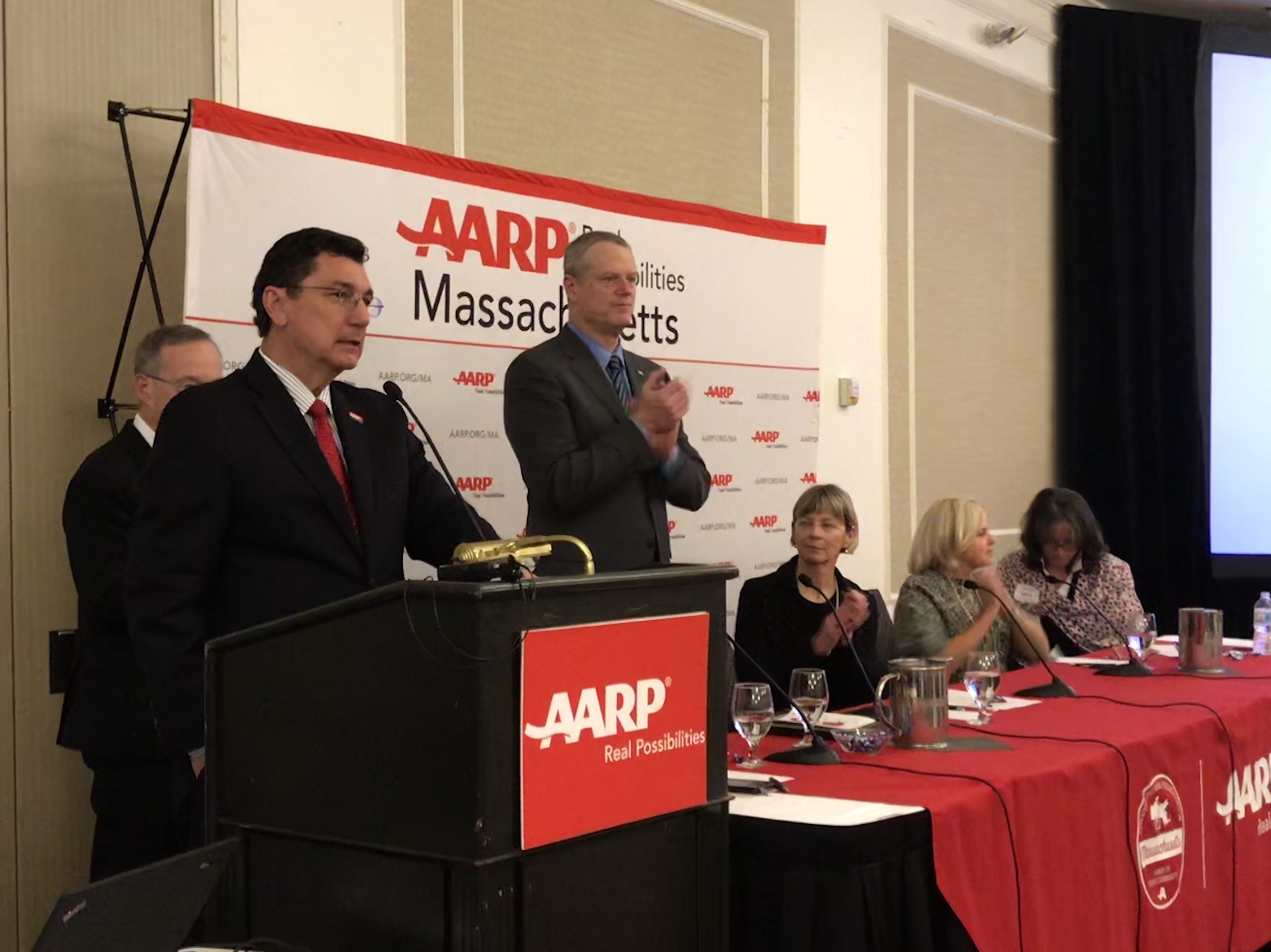AARP Hearing Center


Commitment to meet AARP, WHO guidelines will help residents of all ages
Boston – AARP National Board President Eric J. Schneidewind today presented Governor Charlie Baker with an official certification welcoming Massachusetts into the AARP network of Age-Friendly States and the World Health Organization Global Network of Age Friendly Cities and Communities. Governor Baker accepted the award in front of 200 attendees at AARP’s annual volunteer meeting in Framingham.
“We are delighted to acknowledge the commitment of Massachusetts to become an age-friendly state – only the second in the nation to take this step,” said Schneidewind. New York enrolled with AARP to become an age-friendly state last year.
AARP’s Age-Friendly Network asks for commitment from state elected leadership to work actively toward making the state a great place to live for people of all ages.
“Many of Massachusetts’ older adults have the time, energy and talent available to start a second or third career, volunteer in their community, become a mentor or pursue an unfulfilled passion,” said Governor Baker. “By enrolling in the network of Age-Friendly States, Massachusetts embraces the opportunity to promote, celebrate and lead on aging.”
Today, Governor Baker outlined the work of his Council to Address Aging in Massachusetts, established last year to seek input from leaders from the aging, business, government, nonprofit, technology, education, transportation, housing and health care sectors to recommend innovative policies and best practices to support and engage older residents. Baker released the Council’s 36 page report identifying opportunities to make the Commonwealth the most age friendly state in the nation.
Adults aged 60 and over are the fastest-growing segment of the U.S. population and will make up 23% of the Commonwealth’s population by 2035.
“AARP enthusiastically supports Governor Baker’s initiative to make Massachusetts an Age-Friendly state,” said AARP Massachusetts State Director Mike Festa. “We thank Secretary of Health and Human Services Marylou Sudders, Secretary of Elder Affairs Alice Bonner and the Governor’s Council to Address Aging for their efforts in embracing the age-friendly movement in Massachusetts. We also thank our partners James Fuccione, Senior Director of the Massachusetts Healthy Aging Collaborative, Nora Moreno Cargie of the Tufts Health Plan Foundation, Dave Stevens of the Massachusetts Councils on Aging, and the University of Massachusetts Gerontology Institute.”
The AARP Network of Age-Friendly States and Communities helps participating states become great places by adopting such features as walkable streets, better housing and transportation options, access to key services and opportunities for residents to participate in community activities. Well-designed, livable communities help sustain economic growth and make for happier, healthier residents — of all ages. The AARP Age-Friendly Network is an affiliate of the World Health Organization’s Global Network of Age-Friendly Cities and Communities, an international effort launched in 2006 to help cities prepare for their own and the world’s growing population of older adults and the parallel trend of urbanization.
The eight Age-Friendly/Livable Community domains outlined by WHO and AARP are:
- Outdoor spaces and buildings
- Transportation
- Housing
- Social participation
- Respect and social inclusion
- Work and civic engagement
- Communication and information, and
- Community and health services.
AARP’s participation in the age-friendly network advances the Association’s efforts to help people live easily and comfortably in their homes and communities as they age. AARP surveys show that nearly 90% of the 50+ population want to stay in their homes and communities as they age, where they have strong social networks and a sense of familiarity.
AARP encourages older adults to take an active role in their communities’ plans and ensures that their voices are heard. Related initiatives focus on areas such as housing, caregiving, community engagement, volunteering, social inclusion and combating isolation among older people.
For more information, visit aarp.org/livable































































